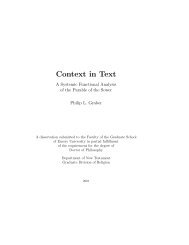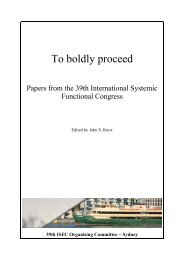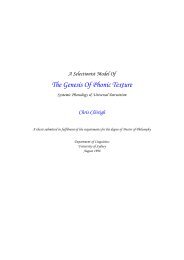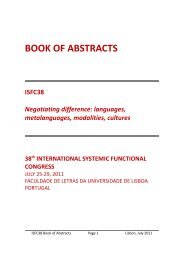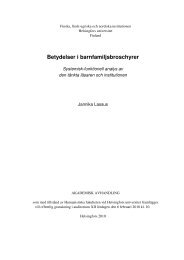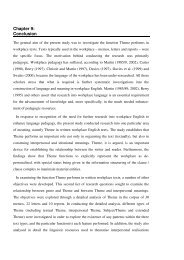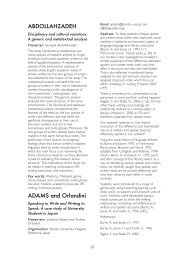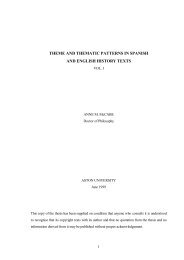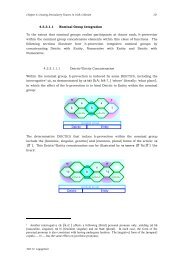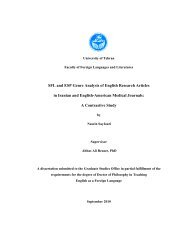- Page 1 and 2:
LA GENERACIÓN DE TIEMPO Y ASPECTOE
- Page 3 and 4:
ÍNDICE GENERALÍNDICE DE TABLASXIV
- Page 5 and 6:
2.3.1.1. Los límites imprecisos de
- Page 7 and 8:
3.1.2.3.2. Referencia de futuro en
- Page 9 and 10:
3.4.1.2. Pasado estructural .......
- Page 11 and 12:
3.7.1.3. Resumen de los usos de la
- Page 13 and 14:
4.1.3. EL LÉXICO..................
- Page 15 and 16:
4.3.3.3. Situación estructural de
- Page 17 and 18:
Tabla 3.22. Usos del Condicional es
- Page 19 and 20:
Tabla 4.2. Realizaciones asociadas
- Page 21 and 22:
Índice de figurasFigura 1.1. Siste
- Page 23 and 24:
Figura 4.4. Sistema de PERFECTIVITY
- Page 25 and 26:
Juan Rafael Zamorano Mansillaguaje.
- Page 27 and 28:
Juan Rafael Zamorano Mansillacomput
- Page 29 and 30:
Juan Rafael Zamorano MansillaComo y
- Page 31 and 32:
Juan Rafael Zamorano Mansilla1.4. M
- Page 33 and 34:
Juan Rafael Zamorano MansillaPor es
- Page 35 and 36:
Juan Rafael Zamorano Mansillaciones
- Page 37 and 38:
Juan Rafael Zamorano Mansillaaporta
- Page 39 and 40:
Juan Rafael Zamorano Mansillaen cua
- Page 42 and 43:
IntroducciónAsí pues, tras aplica
- Page 44 and 45:
Introducciónman 1998:3). Es decir,
- Page 46 and 47:
Introducciónesté determinado por
- Page 48 and 49:
Introducciónpectos dinámicos del
- Page 50 and 51:
Introducción2) Los significados o
- Page 52 and 53:
IntroducciónFinalmente, el capítu
- Page 54 and 55:
Revisión de las categorías de tie
- Page 56 and 57:
Revisión de las categorías de tie
- Page 58 and 59:
Revisión de las categorías de tie
- Page 60 and 61:
Revisión de las categorías de tie
- Page 62 and 63:
Revisión de las categorías de tie
- Page 64 and 65:
Revisión de las categorías de tie
- Page 66 and 67:
Revisión de las categorías de tie
- Page 68 and 69:
Revisión de las categorías de tie
- Page 70 and 71:
Revisión de las categorías de tie
- Page 72 and 73:
Revisión de las categorías de tie
- Page 74 and 75:
Revisión de las categorías de tie
- Page 76 and 77:
Revisión de las categorías de tie
- Page 78 and 79:
Revisión de las categorías de tie
- Page 80 and 81:
Revisión de las categorías de tie
- Page 82 and 83:
Revisión de las categorías de tie
- Page 84 and 85:
Revisión de las categorías de tie
- Page 86 and 87:
Revisión de las categorías de tie
- Page 88 and 89:
Revisión de las categorías de tie
- Page 90 and 91:
Revisión de las categorías de tie
- Page 92 and 93:
Revisión de las categorías de tie
- Page 94 and 95:
Revisión de las categorías de tie
- Page 96 and 97:
Revisión de las categorías de tie
- Page 98 and 99:
Revisión de las categorías de tie
- Page 100 and 101:
Revisión de las categorías de tie
- Page 103 and 104:
Juan Rafael Zamorano Mansillasu con
- Page 106 and 107:
Revisión de las categorías de tie
- Page 108:
Revisión de las categorías de tie
- Page 111 and 112:
Juan Rafael Zamorano MansillaG. Lee
- Page 113 and 114:
Juan Rafael Zamorano Mansillasión
- Page 115 and 116:
Juan Rafael Zamorano Mansillalos ve
- Page 117 and 118:
Juan Rafael Zamorano Mansillaa) “
- Page 119 and 120:
Juan Rafael Zamorano Mansillaoposic
- Page 121 and 122:
Juan Rafael Zamorano Mansillaen lo
- Page 123 and 124:
Juan Rafael Zamorano Mansillae) los
- Page 125 and 126:
Juan Rafael Zamorano Mansillaha alc
- Page 127 and 128:
Juan Rafael Zamorano Mansillapítul
- Page 129 and 130:
Juan Rafael Zamorano MansillaEs des
- Page 131 and 132:
Juan Rafael Zamorano MansillaOtra s
- Page 133 and 134:
Juan Rafael Zamorano Mansillaf) el
- Page 135 and 136:
Juan Rafael Zamorano Mansillaaconte
- Page 137 and 138:
Juan Rafael Zamorano Mansilla“No
- Page 139 and 140:
Juan Rafael Zamorano MansillaE,RSES
- Page 141 and 142: Juan Rafael Zamorano Mansillatiempo
- Page 143 and 144: Juan Rafael Zamorano MansillaPero t
- Page 145 and 146: Juan Rafael Zamorano MansillaPara B
- Page 147 and 148: Juan Rafael Zamorano Mansilladomini
- Page 149 and 150: Juan Rafael Zamorano Mansillarefere
- Page 151 and 152: Juan Rafael Zamorano MansillaPero a
- Page 153 and 154: Juan Rafael Zamorano Mansillaque di
- Page 155 and 156: Juan Rafael Zamorano Mansilla¡Qui
- Page 157 and 158: Juan Rafael Zamorano Mansilladesarr
- Page 159 and 160: Juan Rafael Zamorano Mansillatipo i
- Page 161 and 162: Juan Rafael Zamorano Mansillade man
- Page 163 and 164: Juan Rafael Zamorano Mansillala teo
- Page 165 and 166: Juan Rafael Zamorano Mansillanomena
- Page 167 and 168: Juan Rafael Zamorano MansillaEsta d
- Page 169 and 170: Juan Rafael Zamorano Mansillauna in
- Page 171 and 172: Juan Rafael Zamorano MansillaIgualm
- Page 173 and 174: Juan Rafael Zamorano MansillaI gath
- Page 175 and 176: Juan Rafael Zamorano MansillaComent
- Page 177 and 178: Juan Rafael Zamorano Mansillamo tie
- Page 179 and 180: Juan Rafael Zamorano MansillaLas ac
- Page 181 and 182: Juan Rafael Zamorano MansillaEste e
- Page 183 and 184: Juan Rafael Zamorano Mansillaocurre
- Page 185 and 186: Juan Rafael Zamorano Mansillaembarg
- Page 187 and 188: Juan Rafael Zamorano Mansillados en
- Page 189 and 190: Juan Rafael Zamorano Mansillahorari
- Page 191: Juan Rafael Zamorano Mansilla3.1.1.
- Page 195 and 196: Juan Rafael Zamorano Mansillaoracio
- Page 197 and 198: Juan Rafael Zamorano Mansillala que
- Page 199 and 200: Juan Rafael Zamorano Mansillab) de
- Page 201 and 202: Juan Rafael Zamorano Mansilla(6) It
- Page 203 and 204: Juan Rafael Zamorano Mansillanitiva
- Page 205 and 206: Juan Rafael Zamorano MansillaNótes
- Page 207 and 208: Juan Rafael Zamorano Mansillae) Fin
- Page 209 and 210: Juan Rafael Zamorano Mansillapos de
- Page 211 and 212: Juan Rafael Zamorano Mansilla(18) U
- Page 213 and 214: Juan Rafael Zamorano MansillaOtras
- Page 215 and 216: Juan Rafael Zamorano Mansillacon ti
- Page 217 and 218: Juan Rafael Zamorano MansillaEl res
- Page 219 and 220: Juan Rafael Zamorano Mansilla3.1.2.
- Page 221 and 222: Juan Rafael Zamorano Mansilla(2) ¿
- Page 223 and 224: Juan Rafael Zamorano MansillaTambi
- Page 225 and 226: Juan Rafael Zamorano Mansilla(3) ¡
- Page 227 and 228: Juan Rafael Zamorano MansillaEstos
- Page 229 and 230: Juan Rafael Zamorano Mansilla(5) Pa
- Page 231 and 232: Juan Rafael Zamorano Mansilla3.1.2.
- Page 233 and 234: Juan Rafael Zamorano Mansilla(1) Bu
- Page 235 and 236: Juan Rafael Zamorano Mansilla‣ En
- Page 237 and 238: Juan Rafael Zamorano Mansilla3.1.3.
- Page 239 and 240: Juan Rafael Zamorano Mansilla1087 e
- Page 241 and 242: Juan Rafael Zamorano Mansilla3.2. L
- Page 243 and 244:
Juan Rafael Zamorano Mansilla3.2.1.
- Page 245 and 246:
Juan Rafael Zamorano MansillaDentro
- Page 247 and 248:
Juan Rafael Zamorano MansillaPresen
- Page 249 and 250:
Juan Rafael Zamorano Mansilla3.2.1.
- Page 251 and 252:
Juan Rafael Zamorano Mansilla3.2.2.
- Page 253 and 254:
Juan Rafael Zamorano Mansillacompon
- Page 255 and 256:
Juan Rafael Zamorano Mansillade los
- Page 257 and 258:
Juan Rafael Zamorano Mansilla3.2.2.
- Page 259 and 260:
Juan Rafael Zamorano Mansillatipo d
- Page 261 and 262:
Juan Rafael Zamorano Mansilladescri
- Page 263 and 264:
Juan Rafael Zamorano Mansilla(11) P
- Page 265 and 266:
Juan Rafael Zamorano Mansillaque ex
- Page 267 and 268:
Juan Rafael Zamorano MansillaObsér
- Page 269 and 270:
Juan Rafael Zamorano Mansillaque es
- Page 271 and 272:
Juan Rafael Zamorano Mansilla3.2.2.
- Page 273 and 274:
Juan Rafael Zamorano Mansilla3.2.3.
- Page 275 and 276:
Juan Rafael Zamorano Mansilla3.3. L
- Page 277 and 278:
Juan Rafael Zamorano MansillaPodrí
- Page 279 and 280:
Juan Rafael Zamorano Mansillaforma
- Page 281 and 282:
Juan Rafael Zamorano Mansilla(29)
- Page 283 and 284:
Juan Rafael Zamorano MansillaUn uso
- Page 285 and 286:
Juan Rafael Zamorano Mansillaque el
- Page 287 and 288:
Juan Rafael Zamorano Mansillauna or
- Page 289 and 290:
Juan Rafael Zamorano Mansilla‣ La
- Page 291 and 292:
Juan Rafael Zamorano Mansillapañol
- Page 293 and 294:
Juan Rafael Zamorano Mansilla(10) P
- Page 295 and 296:
Juan Rafael Zamorano MansillaEste e
- Page 297 and 298:
Juan Rafael Zamorano Mansilla‣ La
- Page 299 and 300:
Juan Rafael Zamorano Mansillatinto
- Page 301 and 302:
Juan Rafael Zamorano Mansilla(8) ¿
- Page 303 and 304:
Juan Rafael Zamorano Mansilladales
- Page 305 and 306:
Juan Rafael Zamorano MansillaOtro e
- Page 307 and 308:
Juan Rafael Zamorano Mansillaotras
- Page 309 and 310:
Juan Rafael Zamorano Mansilla(3) me
- Page 311 and 312:
Juan Rafael Zamorano Mansilla3.4.3.
- Page 313 and 314:
Juan Rafael Zamorano MansillaTambi
- Page 315 and 316:
Juan Rafael Zamorano MansillaAdemá
- Page 317 and 318:
Juan Rafael Zamorano Mansilla3) alg
- Page 319 and 320:
Juan Rafael Zamorano MansillaLa sig
- Page 321 and 322:
Juan Rafael Zamorano Mansilla(7) Wh
- Page 323 and 324:
Juan Rafael Zamorano MansillaMi opi
- Page 325 and 326:
Juan Rafael Zamorano Mansillafinal
- Page 327 and 328:
Juan Rafael Zamorano Mansillavalo d
- Page 329 and 330:
Juan Rafael Zamorano Mansillapasado
- Page 331 and 332:
Juan Rafael Zamorano Mansilla(13) I
- Page 333 and 334:
Juan Rafael Zamorano Mansilla(26) H
- Page 335 and 336:
Juan Rafael Zamorano Mansillavedad
- Page 337 and 338:
Juan Rafael Zamorano Mansilla(has b
- Page 339 and 340:
Juan Rafael Zamorano MansillaHay va
- Page 341 and 342:
Juan Rafael Zamorano Mansillasiguie
- Page 343 and 344:
Juan Rafael Zamorano Mansillapor lo
- Page 345 and 346:
Juan Rafael Zamorano Mansilla‣ El
- Page 347 and 348:
Juan Rafael Zamorano Mansilla3.5.2.
- Page 349 and 350:
Juan Rafael Zamorano MansillaLos us
- Page 351 and 352:
Juan Rafael Zamorano Mansillaal Pas
- Page 353 and 354:
Juan Rafael Zamorano Mansilladel es
- Page 355 and 356:
Juan Rafael Zamorano Mansilla3.5.2.
- Page 357 and 358:
Juan Rafael Zamorano Mansillab) en
- Page 359 and 360:
Juan Rafael Zamorano Mansillaobserv
- Page 361 and 362:
Juan Rafael Zamorano Mansilla‣ El
- Page 363 and 364:
Juan Rafael Zamorano Mansilla‣ La
- Page 365 and 366:
Juan Rafael Zamorano Mansillaanoche
- Page 367 and 368:
Juan Rafael Zamorano MansillaUsos d
- Page 369 and 370:
Juan Rafael Zamorano Mansillaportan
- Page 371 and 372:
Juan Rafael Zamorano Mansillalugar
- Page 373 and 374:
Juan Rafael Zamorano Mansilla(35) T
- Page 375 and 376:
Juan Rafael Zamorano Mansillatempor
- Page 377 and 378:
Juan Rafael Zamorano Mansilla3.6.2.
- Page 379 and 380:
Juan Rafael Zamorano Mansilla(6) Aq
- Page 381 and 382:
Juan Rafael Zamorano Mansilla(20) P
- Page 383 and 384:
Juan Rafael Zamorano MansillaFinalm
- Page 385 and 386:
Juan Rafael Zamorano Mansillaque si
- Page 387 and 388:
Juan Rafael Zamorano Mansillafectiv
- Page 389 and 390:
Juan Rafael Zamorano Mansillaen los
- Page 391 and 392:
Juan Rafael Zamorano Mansilla‣ Fi
- Page 393 and 394:
Juan Rafael Zamorano Mansillael con
- Page 395 and 396:
Juan Rafael Zamorano MansillaEstos
- Page 397 and 398:
Juan Rafael Zamorano Mansillael Fut
- Page 399 and 400:
Juan Rafael Zamorano Mansillael cas
- Page 401 and 402:
Juan Rafael Zamorano Mansilla(9)so
- Page 403 and 404:
Juan Rafael Zamorano Mansilla3.7.2.
- Page 405 and 406:
Juan Rafael Zamorano Mansilla(9)Y a
- Page 407 and 408:
Juan Rafael Zamorano Mansillaestabl
- Page 409 and 410:
Juan Rafael Zamorano Mansilla3.7.3.
- Page 411 and 412:
Juan Rafael Zamorano Mansilla(9)yes
- Page 413 and 414:
Juan Rafael Zamorano MansillaComo y
- Page 415 and 416:
Juan Rafael Zamorano Mansilla3.10.
- Page 417 and 418:
Juan Rafael Zamorano Mansillarequie
- Page 419 and 420:
Juan Rafael Zamorano MansillaEn eje
- Page 421 and 422:
Juan Rafael Zamorano Mansilla‣ La
- Page 423 and 424:
Juan Rafael Zamorano Mansilla(1) En
- Page 425 and 426:
Juan Rafael Zamorano Mansilla(14) D
- Page 427 and 428:
Juan Rafael Zamorano MansillaEjempl
- Page 429 and 430:
Juan Rafael Zamorano Mansilla3.12.
- Page 431 and 432:
Juan Rafael Zamorano Mansilla(6) Ah
- Page 433 and 434:
Juan Rafael Zamorano Mansilla(20) L
- Page 435 and 436:
Juan Rafael Zamorano Mansilla3.13.
- Page 437 and 438:
Juan Rafael Zamorano Mansillafecto
- Page 439 and 440:
Juan Rafael Zamorano Mansillafenome
- Page 441 and 442:
Juan Rafael Zamorano MansillaTodos
- Page 443 and 444:
Juan Rafael Zamorano MansillaProgre
- Page 445 and 446:
Juan Rafael Zamorano Mansilla3.13.2
- Page 447 and 448:
Juan Rafael Zamorano MansillaRealiz
- Page 449 and 450:
Juan Rafael Zamorano Mansilladonde
- Page 451 and 452:
Juan Rafael Zamorano Mansilla(1)(2)
- Page 453 and 454:
Juan Rafael Zamorano MansillaNo obs
- Page 455 and 456:
Juan Rafael Zamorano Mansillagresiv
- Page 457 and 458:
Juan Rafael Zamorano Mansilla3.13.2
- Page 459 and 460:
Juan Rafael Zamorano Mansilla(5)No,
- Page 461 and 462:
Juan Rafael Zamorano MansillaNo obs
- Page 463 and 464:
Juan Rafael Zamorano Mansillabas re
- Page 465 and 466:
Juan Rafael Zamorano Mansilla3.13.3
- Page 467 and 468:
Juan Rafael Zamorano Mansillaqueda
- Page 469 and 470:
Juan Rafael Zamorano MansillaTipo d
- Page 471 and 472:
Juan Rafael Zamorano Mansillauna le
- Page 473 and 474:
Juan Rafael Zamorano Mansillavos, y
- Page 475 and 476:
Juan Rafael Zamorano MansillaRealiz
- Page 477 and 478:
Juan Rafael Zamorano Mansillaresult
- Page 479 and 480:
Juan Rafael Zamorano Mansillanocimi
- Page 481 and 482:
Juan Rafael Zamorano Mansillamento
- Page 483 and 484:
Juan Rafael Zamorano Mansilla4. Esp
- Page 485 and 486:
Juan Rafael Zamorano Mansillay a me
- Page 487 and 488:
Juan Rafael Zamorano Mansillarador
- Page 489 and 490:
Juan Rafael Zamorano Mansilla4.1.4.
- Page 491 and 492:
Juan Rafael Zamorano Mansilla4.2. D
- Page 493 and 494:
Juan Rafael Zamorano Mansillael int
- Page 495 and 496:
Juan Rafael Zamorano Mansillarando
- Page 497 and 498:
Juan Rafael Zamorano Mansillaacepta
- Page 499 and 500:
Juan Rafael Zamorano Mansillaque es
- Page 501 and 502:
Juan Rafael Zamorano MansillaFigura
- Page 503 and 504:
Juan Rafael Zamorano MansillaLa sel
- Page 505 and 506:
Juan Rafael Zamorano Mansilla“¿L
- Page 507 and 508:
Juan Rafael Zamorano MansillaFigura
- Page 509 and 510:
Juan Rafael Zamorano MansillaFigura
- Page 511 and 512:
Juan Rafael Zamorano MansillaLa res
- Page 513 and 514:
Juan Rafael Zamorano Mansilla“¿D
- Page 515 and 516:
Juan Rafael Zamorano Mansilladel ca
- Page 517 and 518:
Juan Rafael Zamorano Mansilla4.2.4.
- Page 519 and 520:
Juan Rafael Zamorano MansillaFigura
- Page 521 and 522:
Juan Rafael Zamorano MansillaFigura
- Page 523 and 524:
Juan Rafael Zamorano Mansillate; en
- Page 525 and 526:
Juan Rafael Zamorano Mansillaexiste
- Page 527 and 528:
Juan Rafael Zamorano Mansillafenóm
- Page 529 and 530:
Juan Rafael Zamorano Mansilladas po
- Page 531 and 532:
Juan Rafael Zamorano MansillaComo s
- Page 533 and 534:
Juan Rafael Zamorano Mansillay Pasa
- Page 535 and 536:
Juan Rafael Zamorano MansillaAnteri
- Page 537 and 538:
Juan Rafael Zamorano Mansillaforma
- Page 539 and 540:
Juan Rafael Zamorano MansillaSimple
- Page 541 and 542:
Juan Rafael Zamorano Mansillarealiz
- Page 543 and 544:
Juan Rafael Zamorano MansillaPoster
- Page 545 and 546:
Juan Rafael Zamorano MansillaSimult
- Page 547 and 548:
Juan Rafael Zamorano MansillaCombin
- Page 549 and 550:
Juan Rafael Zamorano Mansilladel fu
- Page 551 and 552:
Juan Rafael Zamorano MansillaAdemá
- Page 553 and 554:
Juan Rafael Zamorano MansillaRecent
- Page 555 and 556:
Juan Rafael Zamorano MansillaRecent
- Page 557 and 558:
Juan Rafael Zamorano Mansilla(LEXIC
- Page 559 and 560:
Juan Rafael Zamorano MansillaSimple
- Page 561 and 562:
Juan Rafael Zamorano MansillaPoster
- Page 563 and 564:
Juan Rafael Zamorano Mansilla4.3. E
- Page 565 and 566:
Juan Rafael Zamorano MansillaRasgos
- Page 567 and 568:
Juan Rafael Zamorano Mansilla4.3.1.
- Page 569 and 570:
Juan Rafael Zamorano MansillaDatos
- Page 571 and 572:
Juan Rafael Zamorano Mansilla4.3.1.
- Page 573 and 574:
Juan Rafael Zamorano Mansilla(EXAMP
- Page 575 and 576:
Juan Rafael Zamorano Mansilla4.3.2.
- Page 577 and 578:
Juan Rafael Zamorano Mansilla:perfe
- Page 579 and 580:
Juan Rafael Zamorano Mansilla:anter
- Page 581 and 582:
Juan Rafael Zamorano Mansilla:exhau
- Page 583 and 584:
Juan Rafael Zamorano Mansilla4.3.3.
- Page 585 and 586:
Juan Rafael Zamorano Mansilla4.3.3.
- Page 587 and 588:
Juan Rafael Zamorano Mansilla5. Con
- Page 589 and 590:
Juan Rafael Zamorano Mansillaneral
- Page 591 and 592:
Juan Rafael Zamorano Mansilla4) Otr
- Page 593 and 594:
Juan Rafael Zamorano Mansillade una
- Page 595 and 596:
Juan Rafael Zamorano Mansilla1. Los
- Page 597 and 598:
Juan Rafael Zamorano Mansilla5. Un
- Page 599 and 600:
Juan Rafael Zamorano Mansilla4. El
- Page 601 and 602:
Juan Rafael Zamorano Mansilla3. A u
- Page 603 and 604:
Juan Rafael Zamorano Mansilla1. No
- Page 605 and 606:
Juan Rafael Zamorano MansillaAnte t
- Page 607 and 608:
Juan Rafael Zamorano MansillaRefere
- Page 609 and 610:
Juan Rafael Zamorano MansillaBatema
- Page 611 and 612:
Juan Rafael Zamorano MansillaCartag
- Page 613 and 614:
Juan Rafael Zamorano MansillaDavids
- Page 615 and 616:
Juan Rafael Zamorano MansillaFerná
- Page 617 and 618:
Juan Rafael Zamorano MansillaHerná
- Page 619 and 620:
Juan Rafael Zamorano MansillaKenny,
- Page 621 and 622:
Juan Rafael Zamorano MansillaMann,
- Page 623 and 624:
Juan Rafael Zamorano Mansilla----,
- Page 625 and 626:
Juan Rafael Zamorano MansillaSchlyt
- Page 627 and 628:
Juan Rafael Zamorano MansillaVet, C



